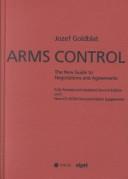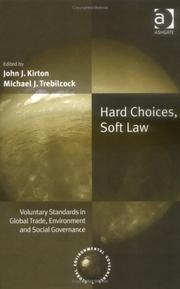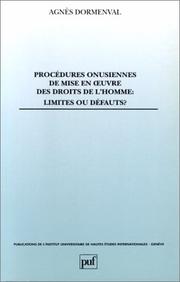| Listing 1 - 7 of 7 |
Sort by
|
Book
ISBN: 9781409443636 9781409443643 1409443647 1409443639 1317153197 1317153189 1280689250 9786613666192 9781315576381 9781317153177 9781317153184 9781138110250 1315576384 Year: 2012 Publisher: Farnham Ashgate Pub. Ltd
Abstract | Keywords | Export | Availability | Bookmark
 Loading...
Loading...Choose an application
- Reference Manager
- EndNote
- RefWorks (Direct export to RefWorks)
Over the course of the twentieth-century, democracies demonstrated an uncanny ability to win wars when their survival was at stake. As this book makes clear, this success cannot be explained merely by superior military equipment or a particular geographical advantage. Instead, it is argued that the legal frameworks imbedded in democratic societies offered them a fundamental advantage over their more politically restricted rivals.
War (International law) --- Democracy. --- Guerre (Droit international) --- Démocratie --- History. --- Histoire --- 855 oorlogsvoering --- 815 Geschiedenis --- 821 Internationaal recht --- Démocratie --- Democracy --- Self-government --- Political science --- Equality --- Representative government and representation --- Republics --- History
Book
ISBN: 9780801447563 9780801477157 0801447569 1336284110 0801457696 0801458935 0801477158 9780801457692 9780801458934 Year: 2011 Publisher: Ithaca, N.Y. Cornell University Press
Abstract | Keywords | Export | Availability | Bookmark
 Loading...
Loading...Choose an application
- Reference Manager
- EndNote
- RefWorks (Direct export to RefWorks)
International relations are generally understood as a realm of anarchy in which countries lack any superior authority and interact within a Hobbesian state of nature. In Hierarchy in International Relations, David A. Lake challenges this traditional view, demonstrating that states exercise authority over one another in international hierarchies that vary historically but are still pervasive today. Revisiting the concepts of authority and sovereignty, Lake offers a novel view of international relations in which states form social contracts that bind both dominant and subordinate members. The resulting hierarchies have significant effects on the foreign policies of states as well as patterns of international conflict and cooperation. Focusing largely on U.S.-led hierarchies in the contemporary world, Lake provides a compelling account of the origins, functions, and limits of political order in the modern international system. The book is a model of clarity in theory, research design, and the use of evidence.Motivated by concerns about the declining international legitimacy of the United States following the Iraq War, Hierarchy in International Relations offers a powerful analytic perspective that has important implications for understanding America's position in the world in the years ahead.
831 Internationale politieke economie --- 821 Internationaal recht --- International relations --- United States --- Foreign relations --- International relations. --- Relations internationales --- Etats-Unis --- Relations extérieures --- Coexistence --- Foreign affairs --- Foreign policy --- Global governance --- Interdependence of nations --- International affairs --- Peaceful coexistence --- World order --- National security --- Sovereignty --- World politics --- International relations. Foreign policy --- United States - Foreign relations - 21st century --- United States - Foreign relations - 21st century.

ISBN: 1588263630 1626370028 9781626370029 9781588263636 Year: 2006 Publisher: Boulder Rienner
Abstract | Keywords | Export | Availability | Bookmark
 Loading...
Loading...Choose an application
- Reference Manager
- EndNote
- RefWorks (Direct export to RefWorks)
With intellectual property widely acknowledged today as a key component of economic development, those accused of stealing knowledge and information are also charged with undermining industrial innovation, artistic creativity, and the availability of information itself. How valid are these claims? Has the Trade Related Aspects of Intellectual Property Rights (TRIPs) Agreement ushered in a new, better era? Christopher May and Susan Sell trace the history of social conflict and political machinations surrounding the making of property out of knowledge. Ranging from ancient commerce in Greek poems to present-day controversies about online piracy and the availability of AIDS drugs in the poorest countries, May and Sell present intellectual property law as a continuing process in which particular conceptions of rights and duties are institutionalized; each settlement prompts new disputes, policy shifts, and new disputes again. They also examine the post-TRIPs era in the context of this process. Their account of two thousand years of technological advances, legal innovation, and philosophical arguments about the character of knowledge production suggests that the future of intellectual property law will be as contested as its past.
Intellectual property --- Propriété intellectuelle --- History. --- Political aspects. --- Social aspects. --- Histoire --- Aspect politique --- Aspect social --- IP (Intellectual property) --- Proprietary rights --- Rights, Proprietary --- Intangible property --- Law and legislation --- 821 Internationaal recht --- 822.3 Internationale economische organisaties --- 831 Internationale politieke economie --- History --- Political aspects --- Social aspects --- Intellectual property Social aspects

ISBN: 0761940162 0761940154 144621494X 1446228908 9786612337260 1282337262 1847876420 9781847876423 9780761940166 9780761940159 9781446214947 9781446228906 6612337265 9781282337268 Year: 2002 Publisher: London ; Thousand Oaks, Calif. : Sage Publications,
Abstract | Keywords | Export | Availability | Bookmark
 Loading...
Loading...Choose an application
- Reference Manager
- EndNote
- RefWorks (Direct export to RefWorks)
The revised and updated edition of 'Arms control: the new guide to negotiations and agreements' contains the most authoritative and comprehensive survey ever published of the documents related to arms control. All major agreements reached since the second half of the nineteenth century through to mid-2002 are critically analysed and assessed.
Arms control. --- Disarmament. --- Arms transfers --- Armements --- Désarmement --- Armes --- Law and legislation. --- Contrôle --- Vente --- Droit --- 873 Wapenbeheersing --- 821 Internationaal recht --- 254 Internationale verdragen --- Arms transfers - Law and legislation. --- Arms control --- Disarmament --- International Law --- Treaties, International --- Law, Politics & Government --- Law and legislation --- Désarmement --- Contrôle --- Limitation of armament --- Military power --- Armed Forces --- Arms race --- Military readiness --- Military weapons --- Peace --- Security, International --- War, Maritime (International law) --- War (International law)

ISBN: 1138277398 1315253631 9781351931649 1351931644 9781315253633 9780754609667 0754609669 9781351931625 9781138277397 1351931636 9781351931632 Year: 2007 Publisher: Aldershot Ashgate
Abstract | Keywords | Export | Availability | Bookmark
 Loading...
Loading...Choose an application
- Reference Manager
- EndNote
- RefWorks (Direct export to RefWorks)
An important read for academics and policy-makers alike, Hard Choices, Soft Law asserts that voluntary standards, or 'soft' law, are an important supplement to international law in a number of areas.
Sustainable development --- Standardization. --- Commercial policy --- International trade --- Social responsibility of business. --- International agencies. --- Public-private sector cooperation. --- Private-public partnerships --- Private-public sector cooperation --- Public-private partnerships --- Public-private sector collaboration --- Cooperation --- Associations, International --- IGOs (Intergovernmental organizations) --- Institutions, International --- Inter-governmental organizations --- Intergovernmental organizations --- International administration --- International associations --- International governmental organizations --- International institutions --- International organizations --- International unions --- Organizations, International --- Specialized agencies of the United Nations --- International cooperation --- Interorganizational relations --- Non-state actors (International relations) --- International organization --- Business --- Corporate accountability --- Corporate responsibility --- Corporate social responsibility --- Corporations --- CSR (Corporate social responsibility) --- Industries --- Social responsibility, Corporate --- Social responsibility of industry --- Business ethics --- Issues management --- Foreign trade policy --- International trade policy --- Trade policy --- Economic policy --- International economic relations --- Industrial engineering --- Grading --- Mass production --- Specifications --- Testing --- International cooperation. --- Environmental aspects. --- Social aspects. --- Social responsibility --- Social aspects --- Government policy --- 821 Internationaal recht --- Duurzame ontwikkeling. --- DROIT INTERNATIONAL PUBLIC --- TRAVAILLEURS --- DROIT SOCIAL INTERNATIONAL --- ENVIRONNEMENT --- DEVELOPPEMENT DURABLE --- PROTECTION
Book
ISBN: 1107207827 1282558412 9786612558412 0511713673 0511722982 0511712847 0511714920 0511712111 0511716176 9780511712845 9780511714924 0521760488 9780521760485 9780511712111 9780511722981 Year: 2010 Volume: 65 Publisher: Cambridge New York Cambridge University Press
Abstract | Keywords | Export | Availability | Bookmark
 Loading...
Loading...Choose an application
- Reference Manager
- EndNote
- RefWorks (Direct export to RefWorks)
Anthony Cullen advances an argument for a particular approach to the interpretation of non-international armed conflict in international humanitarian law. The first part examines the origins of the 'armed conflict' concept and its development as the lower threshold for the application of international humanitarian law. Here the meaning of the term is traced from its use in the Hague Regulations of 1899 until the present day. The second part focuses on a number of contemporary developments which have affected the scope of non-international armed conflict. The case law of the International Criminal Tribunals for the former Yugoslavia has been especially influential and the definition of non-international armed conflict provided by this institution is examined in detail. It is argued that this concept represents the most authoritative definition of the threshold and that, despite differences in interpretation, there exist reasons to interpret an identical threshold of application in the Rome Statute.
Humanitarian law. --- Civil war. --- Civil wars --- Intra-state war --- Rebellions --- Government, Resistance to --- International law --- Revolutions --- War --- Humanitarian conventions --- International humanitarian law --- War (International law) --- Geneva Conventions --- Rome Statute of the International Criminal Court --- Estatuto de Roma de la Corte Penal Internacional --- Estatuto de Roma do Tribunal Penal Internacional --- Rimski statut Međunarodnoga kaznenog suda --- Roma Statuta of the International Criminal Court --- Rome Statute for the International Criminal Court --- Statut de Rome de la Cour pénale internationale --- Statuta Mahkamah Pidana Internasional --- Statuta Roma Mahkamah Pidana Internasional --- Statute of the International Criminal Court --- Undang-Undang Roma Tentang Pengadilan Pidana Internasional --- UU Roma Tentang Pengadilan Pidana Internasional --- Statuta Roma tahun 1998 Tentang Mahkamah Pidana Internasional --- Statuta Roma 1998 --- Conventions de Genève --- Geneva Convention --- Konvensi-Konvensi Jenewa --- Zhenevskite konvent︠s︡ii --- Civil war --- Humanitarian law --- 821 Internationaal recht --- Law --- General and Others

ISBN: 2130439845 2940549400 9782130439844 Year: 1991 Volume: *6 Publisher: Graduate Institute Publications
Abstract | Keywords | Export | Availability | Bookmark
 Loading...
Loading...Choose an application
- Reference Manager
- EndNote
- RefWorks (Direct export to RefWorks)
En ces jours où les droits de l’homme sont projetés à l’avant-scène des relations internationales, l’étude d’Agnès Dormenval s’attaque à un problème d’une actualité pratique brûlante, à savoir la possibilité de coordonner et de rationaliser les diverses procédures onusiennes qui ont proliféré en la matière au gré des circonstances et des occasions. Tout en présentant ces diverses procédures, en les classifiant et en les analysant, l’auteur explique leur multiplication et leur évolution par le dynanisme institutionnel ou organique qui profite, d’une part, de toute conjoncture favorable et, d’autre part, de l’évolution du droit international dans le sens de l’abaissement de certains obstacles ou de la création de nouvelles possibilités d’action. Il n’empêche que cette action, ou plutôt cet ensemble d’actions et de procédures comporte des limitations et des carences nombreuses. L’auteur opère une distinction entre celles inhérentes au système international en général, et plus particulièrement au système onusien, et d’autres, largement issues du développement cahotique des procédures, qui lui paraissent remédiables. Elle examine les solutions ou améliorations envisagées dans les enceintes onusiennes, et en propose d’autres, qui pourraient l’être. Nous devons savoir gré à l’auteur de nous avoir apporté une critique constructive d’un domaine très mouvant en se situant sur un plan technique sans négliger pour autant les réalités politiques et sociales qui l’environnent.
Basic rights --- Civil rights (International law) --- Direitos humanos --- Droits de l'Homme --- Droits de la personne --- Droits fondamentaux --- Droits individuels --- Grondrechten --- Human rights --- Libertés publiques --- Menschenrechte --- Mensenrechten --- Rechten van de mens --- Rights [Human ] --- Rights of man --- 813 Methodologie --- 820 Internationale Betrekkingen --- 821.5 Mensenrechten --- 821 Internationaal Recht --- 822.1 Verenigde Naties --- 822 Internationale organisaties --- 841 Politiek Bestel --- 855 Oorlogsvoering --- Rights, Human --- Human security --- Transitional justice --- Truth commissions --- Law and legislation --- United Nations. --- UN --- UNO --- Human rights. --- Law, Politics & Government --- Human Rights --- Droits de l'homme (Droit international) --- United Nations --- Nations Unies --- Naciones Unidas --- ONU --- Organisation des Nations Unies --- Organizat︠s︡ii︠a︡ Obʺedinennykh Nat︠s︡iĭ --- OON --- Vereinigte Nationen --- Umot ha-meʼuḥadot --- Organizacja Narodów Zjednoczonych --- ONZ --- Forente nasjoner --- Forenede nationer --- FN --- Förenta nationerna --- Gaertʻianebuli erebi --- Organização das Nações Unidas --- PBB --- Perserikatan Bangsa-Bangsa --- Kokusai Rengō --- Kokuren --- ENSZ --- Egyesült Nemzetek Szövetsége --- Birleșmiș Milletler Teșkilâtı --- Birlăşmiş Millătăr Tăşkilatı --- Birlashgan Millatlar Tashkiloti --- BMT --- YK --- Yhdistyneet kansakunnat --- OUN --- Organizacija Ujedinjenih Nacija --- NU --- Nazioni Unite --- OSN --- Organizace spojených národů --- Sāzmān-i Milal-i Muttafiq --- Bangsa² Bersatu --- Organización de las Naciones Unidas --- Ühinenud Rahvaste Organisatsioon --- ÜRO --- Organismos tōn Hēnōmenōn Ethnōn --- Umoja wa Mataifa --- Vereinten Nationen --- Vereinte Nationen --- Hayʼat al-Umam al-Muttaḥidah --- Verenigde Naties --- VN --- Organizația Națiunilor Unite --- Um --- Lien ho kuo --- OKB --- Organizata e Kombeve të Bashkuara --- Lian he guo --- U.N. --- Umam al-Muttaḥidah --- OĒE --- Hēnōmena Ethnē --- Organizácia Spojených Národov --- Sahaprachāchāt --- Națiunile Unite --- Organizat︠s︡ii︠a︡ na obedinenite nat︠s︡ii --- Organismos Hēnōmenōn Ethnōn --- Manẓūmat al-Umam al-Muttaḥidah --- AAN --- Arhanizatsyi︠a︡ Ab'i︠a︡dnanykh Natsyĭ --- Nações Unidas --- Orhanizat︠s︡ii︠a︡ Ob'i︠e︡dnanykh Nat︠s︡iĭ --- O.Ē.E. --- ʻOngkān Sahaprachāchāt --- Sjuninejal Konob'laq --- Sāzmān-i Milal-i Muttaḥid --- Milal-i Muttaḥid --- Nėgdsėn U̇ndėstniĭ Baĭguullaga --- NUB --- Rāshṭrasaṃgha --- או״מ --- أمم المتحدة --- الأمم المتحدة --- سازمان ملل متحد --- 国際連合 --- 联合囯 --- 聯合國 --- United Nations Organization --- Liên Hiệp Quó̂c --- Liên Hợp Quó̂c --- LHQ --- Kula Samagga --- YūʼAṅʻnʻ --- 联合国 --- Организация на обединените нации --- Организация Объединённых Наций --- droits humains --- évolution du droit --- ONU - Organisation des Nations unies
| Listing 1 - 7 of 7 |
Sort by
|

 Search
Search Feedback
Feedback About UniCat
About UniCat  Help
Help News
News